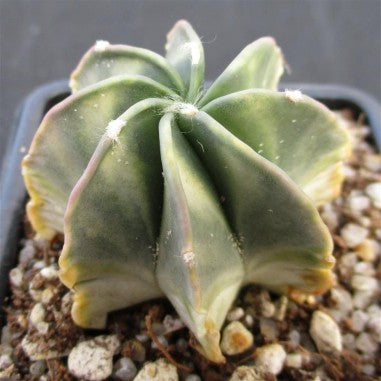VIRIAR
Astrophytum capricorne "Variegata" - Goat's Horn Cactus - 10 seeds
Astrophytum capricorne "Variegata" - Goat's Horn Cactus - 10 seeds
Couldn't load pickup availability
Plant Description
Name: Astrophytum capricorne "Variegata"
Common Names: Goat's Horn Cactus "Variegata", Variegated Goat's Horn Cactus
Astrophytum capricorne "Variegata", commonly known as the Variegated Goat's Horn Cactus, is a unique and visually striking cactus species prized for its distinctive variegated coloration and star-shaped form. Native to the arid regions of northeastern Mexico, this cactus is a member of the Astrophytum genus, known for its interesting shapes and often dramatic patterns. The variegated form displays an eye-catching mix of green, yellow, and cream on its spiny ribs, making it a sought-after specimen among collectors.
The cactus typically grows to about 15-20 cm (6-8 inches) in height and 10-15 cm (4-6 inches) in diameter. It has 8 ribs that are covered with sharp, curved spines resembling goat horns, giving the plant its common name. In the summer, Astrophytum capricorne "Variegata" produces bright yellow flowers with an orange or red center, adding a vibrant contrast to its variegated body. The plant's slow-growing nature and drought tolerance make it an excellent choice for rock gardens, container gardening, or as a unique addition to any cactus collection.
Cultivation of Astrophytum capricorne "Variegata"
Conditions:
- Light: Astrophytum capricorne "Variegata" thrives in bright, direct sunlight. It requires at least 6 hours of full sun daily to maintain its compact growth and enhance its variegated coloration. However, in extremely hot climates, some afternoon shade may be beneficial to prevent sunburn.
- Temperature: This cactus prefers warm temperatures and is well-suited to USDA hardiness zones 9-11. It can tolerate high heat but should be protected from frost, as temperatures below 0°C (32°F) can damage the plant. In cooler climates, it should be grown indoors or in a greenhouse during the winter months.
- Soil: The Variegated Goat's Horn Cactus requires a well-draining cactus or succulent mix. A combination of cactus soil, perlite, and sand is ideal to ensure good drainage and aeration. Avoid using heavy, clay-based soils, which can retain too much moisture and lead to root rot.
- Water: Water sparingly, allowing the soil to dry out completely between waterings. Overwatering can cause root rot, especially in cooler or more humid conditions. During the winter, reduce watering frequency to once every 4-6 weeks as the plant enters dormancy.
Planting and Care:
- Planting: Plant Astrophytum capricorne "Variegata" in a pot with drainage holes to prevent water from accumulating at the roots. Use a well-draining cactus mix and plant at the same depth as it was in its original container. Water lightly after planting to settle the soil, and place in a sunny location.
- Fertilization: Feed the cactus with a balanced, water-soluble fertilizer diluted to half strength once a month during the growing season (spring and summer). Avoid fertilizing during the fall and winter when the plant is dormant. Over-fertilization can cause leggy growth and reduce the plant’s natural variegation.
- Maintenance: Pruning is generally unnecessary for this cactus. Remove any dead or decaying material to prevent pests or diseases. Be cautious of overwatering and ensure that the plant receives adequate sunlight to avoid etiolation (stretching and weak growth).
Propagation
- Seeds: Astrophytum capricorne "Variegata" is commonly propagated from seeds. Sow the seeds in a shallow tray filled with a well-draining cactus mix. Keep the tray in a warm, bright location with indirect sunlight and maintain consistent moisture. Germination can take several weeks to months. The variegation trait may vary among seedlings, and not all will display the variegated pattern.
- Grafting: To preserve the variegated form and accelerate growth, grafting onto a more vigorous rootstock (such as Myrtillocactus geometrizans) is a popular method. This technique can also improve the cold tolerance of the plant.
Shipping & Returns
Shipping & Returns








